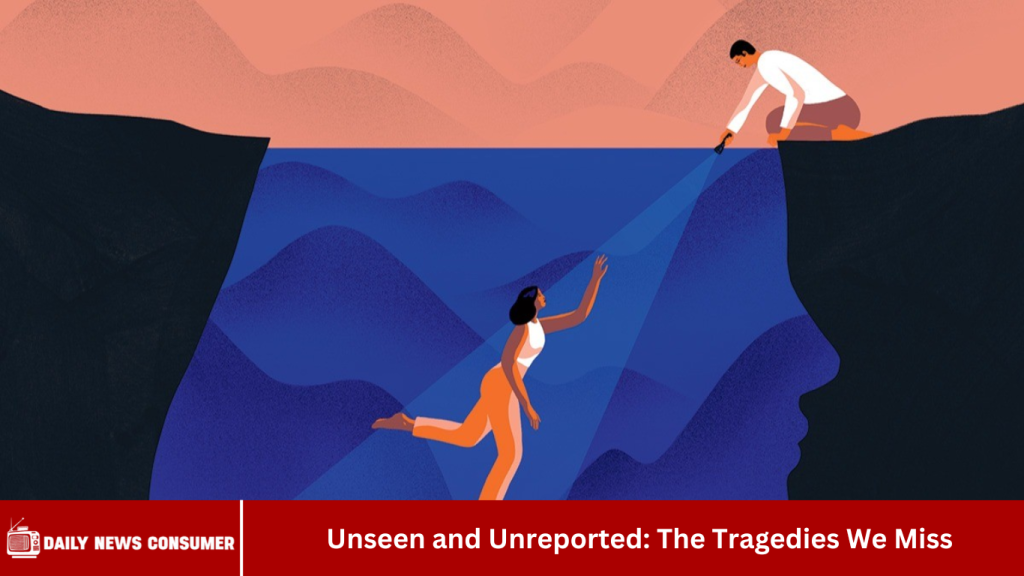Hi everyone! How are you all doing? Welcome to www.dailynewsconsumer.com! In an era dominated by 24/7 news cycles and social media updates, it’s easy to assume that every major tragedy or crisis receives the attention it deserves. Yet, countless disasters, injustices, and human sufferings go unnoticed—either underreported, ignored, or deliberately suppressed. These unseen and unreported tragedies often involve marginalized communities, remote regions, or issues that lack sensational appeal for mainstream media.
This article explores why some tragedies remain invisible, the consequences of their neglect, and what can be done to bring them to light. We’ll also address seven frequently asked questions (FAQs) about unreported crises and their broader implications.
Why Some Tragedies Go Unreported
Media Bias and Commercial Interests
News organizations prioritize stories that attract viewership, clicks, and advertising revenue. Tragedies in wealthy nations or those involving celebrities often dominate headlines, while equally devastating events in poorer regions receive minimal coverage.
Political Suppression
Governments and powerful entities sometimes suppress information to avoid accountability. Censorship, intimidation of journalists, and restricted media access prevent many tragedies from being reported.
Overwhelm and Desensitization
With constant exposure to crises, audiences may become desensitized, leading media outlets to focus only on the most shocking events. Smaller-scale or slow-moving disasters (like famines or environmental degradation) often fade into obscurity.
Lack of Access and Resources
War zones, remote areas, and closed societies make it difficult for journalists to investigate and report on tragedies. Without eyewitness accounts or verifiable data, many stories remain untold.
Examples of Unseen and Unreported Tragedies
The Forgotten Wars
While conflicts in Ukraine and Gaza receive global attention, wars in Yemen, Sudan, and Myanmar claim thousands of lives with little media scrutiny.
Silent Epidemics
Diseases like tuberculosis and malaria kill millions annually, yet they rarely make headlines compared to outbreaks like COVID-19.
Environmental Disasters
Oil spills, deforestation, and industrial pollution devastate communities, but corporate influence often keeps these stories out of the news.
Modern Slavery and Human Trafficking
An estimated 50 million people live in modern slavery, yet their stories are seldom told due to the hidden nature of these crimes.
The Consequences of Ignoring Tragedies
Prolonged Suffering
Without awareness, humanitarian aid and policy changes are delayed, leaving victims without support.
Erosion of Accountability
When tragedies go unreported, perpetrators (whether governments, corporations, or militias) face no consequences.
Global Inequality
Ignoring crises in developing nations reinforces systemic neglect, perpetuating cycles of poverty and instability.
How Can We Bring These Tragedies to Light?
Supporting Independent Journalism
Investigative reporters and nonprofit media often cover stories mainstream outlets ignore. Supporting them ensures more tragedies are exposed.
Leveraging Social Media and Citizen Journalism
Grassroots movements and eyewitness accounts can amplify hidden crises.
Advocating for Policy Changes
Public pressure can push governments and NGOs to address overlooked issues.
Ethical Consumption of News
Seeking out diverse news sources helps counteract media bias.
Frequently Asked Question
Why does the media ignore some tragedies?
Media outlets prioritize stories that generate revenue or align with political agendas. Tragedies in less influential regions often get sidelined.
How can I stay informed about underreported issues?
Follow independent news platforms, humanitarian organizations, and journalists specializing in global crises.
Are social media algorithms part of the problem?
Yes—algorithms favor viral content, often amplifying sensational stories while burying less “engaging” but important tragedies.
What role do governments play in hiding tragedies?
Authoritarian regimes censor news, while even democratic governments may downplay crises to avoid public backlash.
Can individuals make a difference in raising awareness?
Absolutely. Sharing verified information, donating to relief efforts, and contacting representatives can drive change.
Why should we care about tragedies in distant countries?
Global interconnectedness means that crises (like pandemics or refugee movements) eventually affect everyone. Moral responsibility also demands attention.
How do journalists decide which tragedies to cover?
Factors include proximity, audience interest, available resources, and potential political repercussions.
Conclusion
The tragedies we miss are not just gaps in journalism; they are blind spots in our collective conscience. Recognizing this calls us to look deeper, listen harder, and question the filters that shape our perception. Only then can we begin to honor the unheard voices and move toward a more just and empathetic world.

